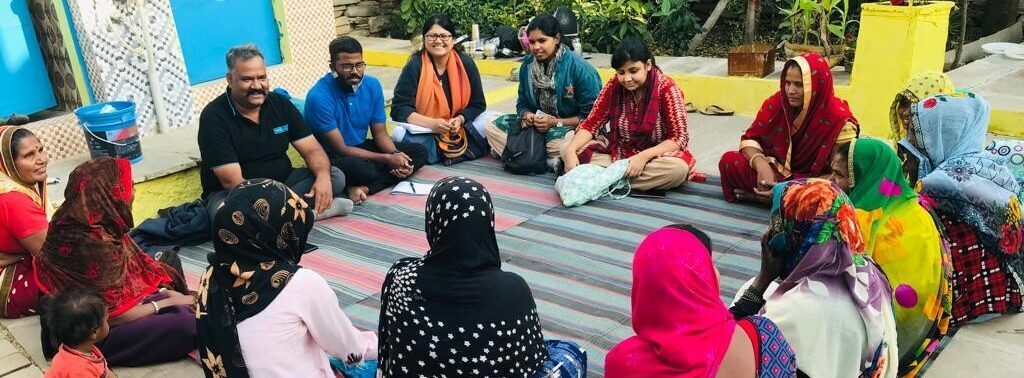Changes and results
Manjari’s work in Budhpura is paying off and has led to a decrease in the number of children that work. Data gathered in the WNCB direct intervention areas shows that over 85% of children go to school every day, an increase of 18% since the programme started in 2019. The motivational centres for children and youth have been critical contributing factors in this significant change. (Data: SenseMaker Study WNCB Rajasthan 2022)
“The norm around child labour has changed, and most parents see the value of education for their kids. However, regularity and retention of children in schools remains an area of concern, and it is more challenging after COVID-19. The unorganised cobble-making in the supply chain is home-based. Although many children go to school, they also cut cobbles at home after school hours. These children are at higher risk of dropping out and getting fully involved in cobble-making.” Manish Singh, Secretary of Manjari
Through forming Self Help Groups, financial literacy training and livelihood support, the economic situation of women and families in the intervention area improved. The continuous dialogue with cobble yard owners, mine owners and companies has built trust with the businesses throughout the sandstone supply chain. The business sector is more accessible and sensitised to the impact of business practices on mine workers and their families. Several stone companies, yards owners in Budhpura, import and export companies started to take the first steps to improve conditions for adults working in sandstone mining and processing. The government of Rajasthan incorporated a child-labour-free clause into its procurement policies.
Changes and results at community level
Norms change on education
Interventions related to education and children’s overall development have worked well and have led to a decrease in the number of children that work, and increase in children attending school: over 85% of the children in the direct intervention area are going to school on a daily basis; an increase of 18% since the programme started in 2019.
The norm in the communities has changed; 94% of parents see the value of education for their children and think that the children’s lives will improve as a result. School and community protection mean that adults feel that children are living in a safe situation. However, regular attendance and the retention of children in schools remain an area of concern, and these are more challenging following the COVID-19 pandemic. The unorganised cobble-making in the supply chain is home-based. Although many children go to school, they also cut cobbles at home after school hours. Most girls aged from 15 to 17 are involved in household chores such as cleaning, cooking, feeding cattle, and sewing.
Data: wncb SenseMaker report 2022
Stronger social structures
People from different castes and social groups started to come together over the years, mingling, talking, sharing food. These new social structures started with the women, through the organisation of women’s Self Help Groups. Healthy and strong social structures are valuable when it comes to, for example, using collective power to negotiate with governments, or as a safety net in crisis situations such as COVID-19 when many families lost their jobs and income.
Women’s financial literacy
The women organised in SHGs were able to achieve economic development, which is crucial for the social security of families and children. As there are no formal banking or saving opportunities in Budhpura, the SHGs were very helpful. Manjari supported the groups with financial literacy training.
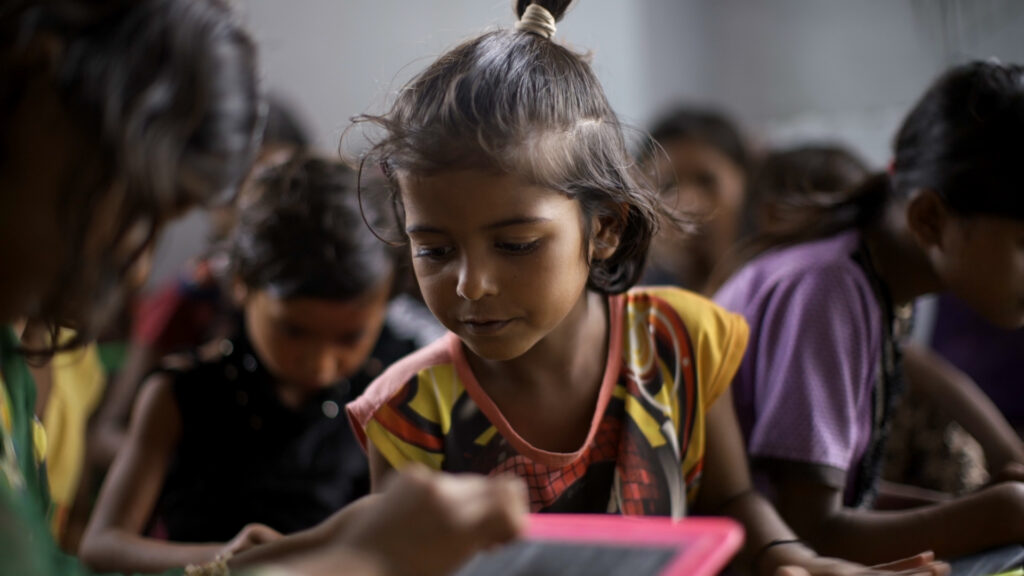
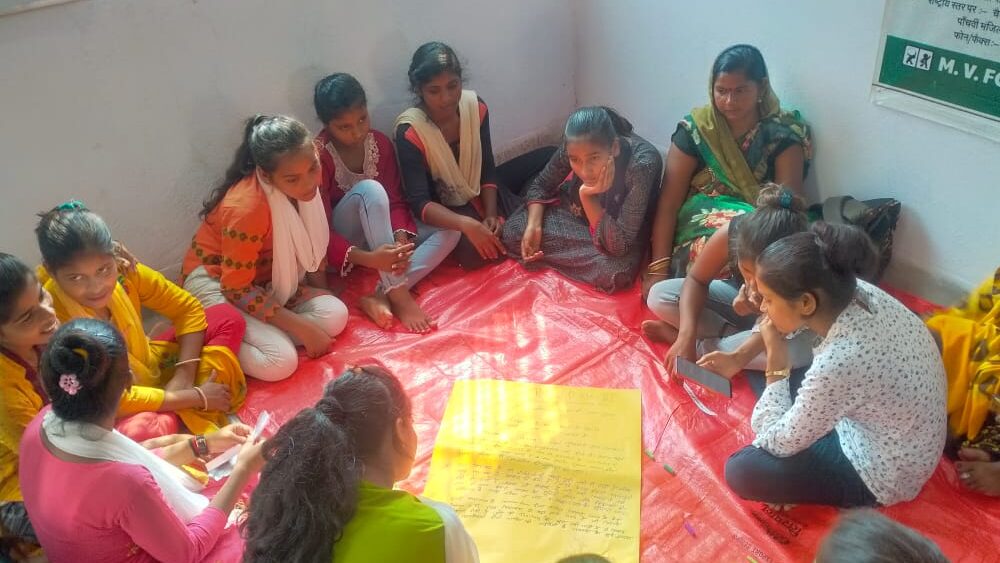
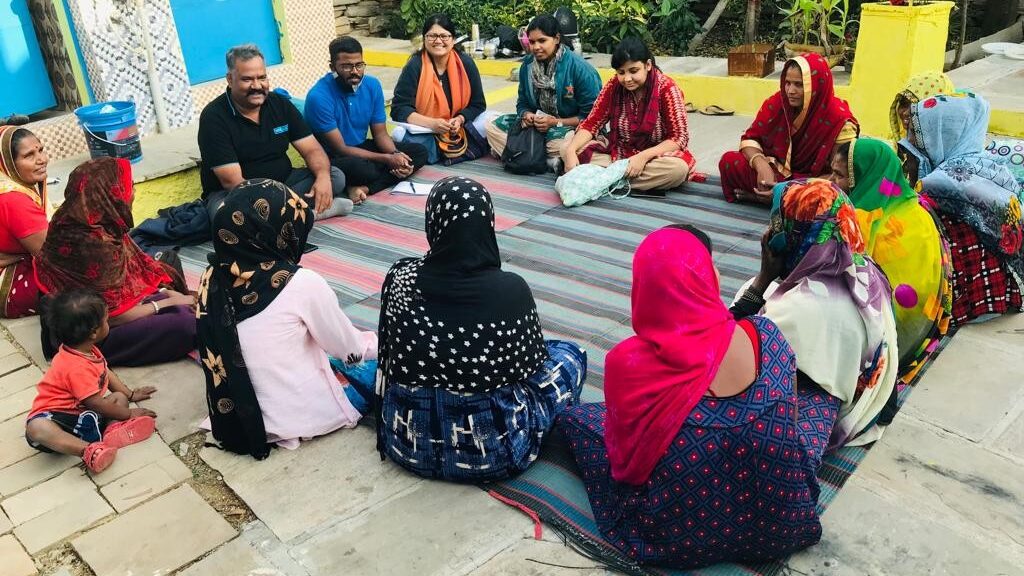
Movitation centers for children and youth
Following continuous dialogue with the community leaders and members, motivation centres are being set up in villages, as well as near mines and cobble yards. Children aged from three to fifteen now regularly attend the motivation classes held in the seven centres. In the centres they are given support in developing their aspirations, educational support, life skills training, menstrual health & hygiene education, skill-building, and sports and cultural activities.
The children attending the motivation centres are now more aware of the importance of education and believe that school enrolment will result in better employment opportunities and livelihoods. Parents, too, support the running of the motivation centres.
Alternative livelihood opportunities
Under the WNCB programme, Manjari supports vulnerable families in Budhpura with alternative livelihood activities such as entrepreneurship and training, as well as support to strengthen and diversify livelihoods. As a result, small businesses such as a wholesale shop, a general shop and a tea stall have been established. Other examples of alternative livelihoods include a group of women who developed their own boulder yard, and two women we supported to set up and run a flour mill.
“One family was supported in opening and running a shop for chai, food items and other basic products. The family has an adult daughter who was abandoned by her husband and has two children, one of whom has disabilities. The father (aged around 60) worked in the stone industry for 30 years. He went to Budhpura and started working in the mines. In 2016 he was checked for silicosis for the first time. The result was negative. In 2019 he was checked again and was diagnosed with silicosis. The symptoms are mainly coughing now. He did receive the three-lakh (around €3,000) compensation from the government. With Manjari’s support, they were able to open a shop and earn an income for the family.”
Also read the story of the Women Self Help Group Shree Radhika.
Access to government schemes
Manjari also supports mineworkers’ families by linking them to government schemes and services. More than 300 mining workers were assisted to get ‘e-Shramik cards’ (labour cards). The e-Shramik cards give workers in the unorganised sectors access to a pension scheme, as well as insurance in case of death or accidents.
Manjari’s broader work within the theme of ensuring families’ access to rights-based entitlements includes: helping families to access/develop adequate documents such as the Aadhaar Card (a unique identity number) and other documents required for enrolment in various social schemes, including accessing benefits from the National Employment Guarantee Scheme, accessing benefits from Rajasthan’s Silicosis Policy, and linking families with public distribution systems and social security schemes.
COVID-19 response actions
There was a high chance that long-term school closures would lead to increased school dropout, children joining the workforce and leaving school forever. The neighbourhood learning centres enabled children to engage in learning while schools were officially closed.
In March 2021, Manjari trained 20 education volunteers to facilitate community-based learning processes, learning spaces were provided by the community and local businesses, and Manjari in collaboration with ARAVALI developed worksheets for different academic grades.
As a result, during the COVID-19 lockdown (April to December 2021) the parents of 400 children in WNCB intervention areas agreed to send their children to continuing education.
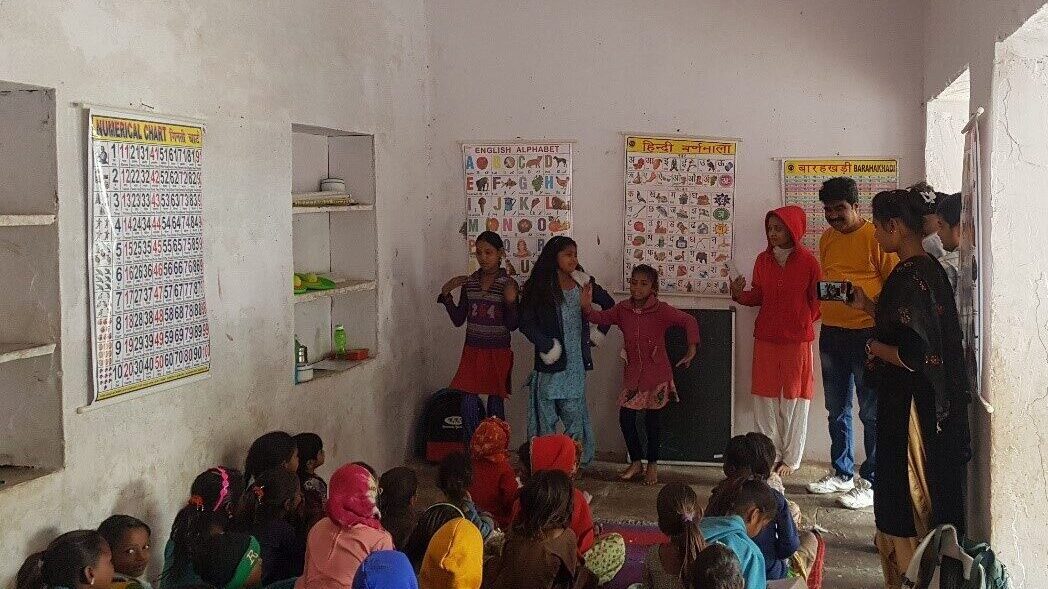


Changes and results at community level with local business
Improved working conditions for adults in the cobble yards
The notion that child labour is no longer accepted in the cobble yards is now accepted in Budhpura – although realisation remains a challenge, especially as cobble-making has increasingly shifted from yards to home work. Manjari continues to make regular visits to worksites and households (many families are given stones to cut at home) to check up on children’s whereabouts and wellbeing.
The continuous dialogue with businesses and awareness-raising of corporate social responsibilities among the local business community has resulted in businesses being more accessible and open to collaboration based on trust. Local businesses are taking first steps to improve adults’ working conditions. In collaboration with Manjari and ARAVALI, six cobble yards, one mining company and three exporting companies (in the processing factories) started paying workers through bank accounts, which is an important step for workers to be able to prove the employment relationship. Some of these cobble yard owners have made improvements on their sites, such as creating rest places in the shade and providing toilets, clean drinking water and a childcare facility.
Three exporting companies improved their sanitation and drinking water facilities, introduced Personal Protective Equipment (PPE), oriented workers on occupational health and safety issues, and created a space for lunch breaks. One exporting company conducted an assessment on discrimination in the workplace. These exporting companies also began to pay workers via bank accounts.
Health camps for mine workers’ families
The target communities in Budhpura have poor access to health care services, which became a serious issue during the COVID-19 pandemic. The mainstream health services were focused on implementing COVID-19 control measures, leaving other health issues unattended. The business owners acknowledged this problem and agreed to organise health camps for workers and their families.
Manjari, together with the local businesses and with help of labour groups and Self Help Groups, scheduled the health camps for August-September 2021. The camps were held on the premises of seven cobble yards in the Budhpura and Dhaneshwar areas of Rajasthan’s Bundi. Manjari hired a team of medical professionals to provide 1,055 children and adults with medical services (checkup, diagnosis, referral and medicine support) through these camps, and the workers were paid their wages for the time spent having their health checkups.

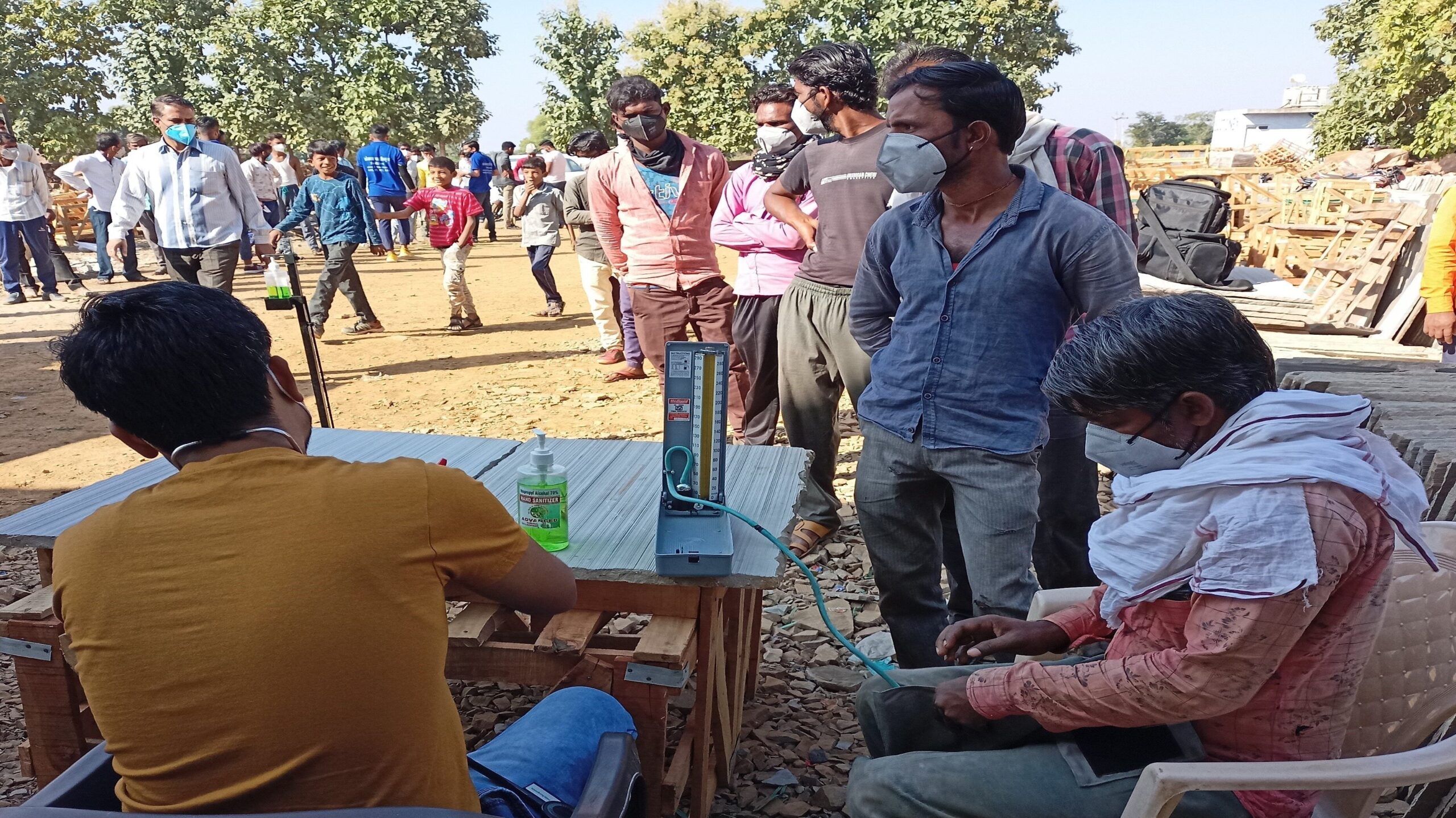

Changes and results in the sandstone supply chain
Dialogue and cooperation with international buyers
The sandstone sector dialogue with TruStone member companies has led to change and improvement in the Bundi region of Rajasthan. As a result of the dialogue sessions with TruStone, trust has been built between suppliers and importers along with an increased awareness of risks in the sandstone supply chain. In addition, ideas were exchanged on how to address these risks. Another outcome of the dialogue sessions is that one supplier has started paying a sub-supplier via bank account instead of in cash.
Overall, the dialogue resulted in momentum among importers and suppliers to embark on a pathway collectively to strengthen corporate social responsibility capacity and work towards improvements.
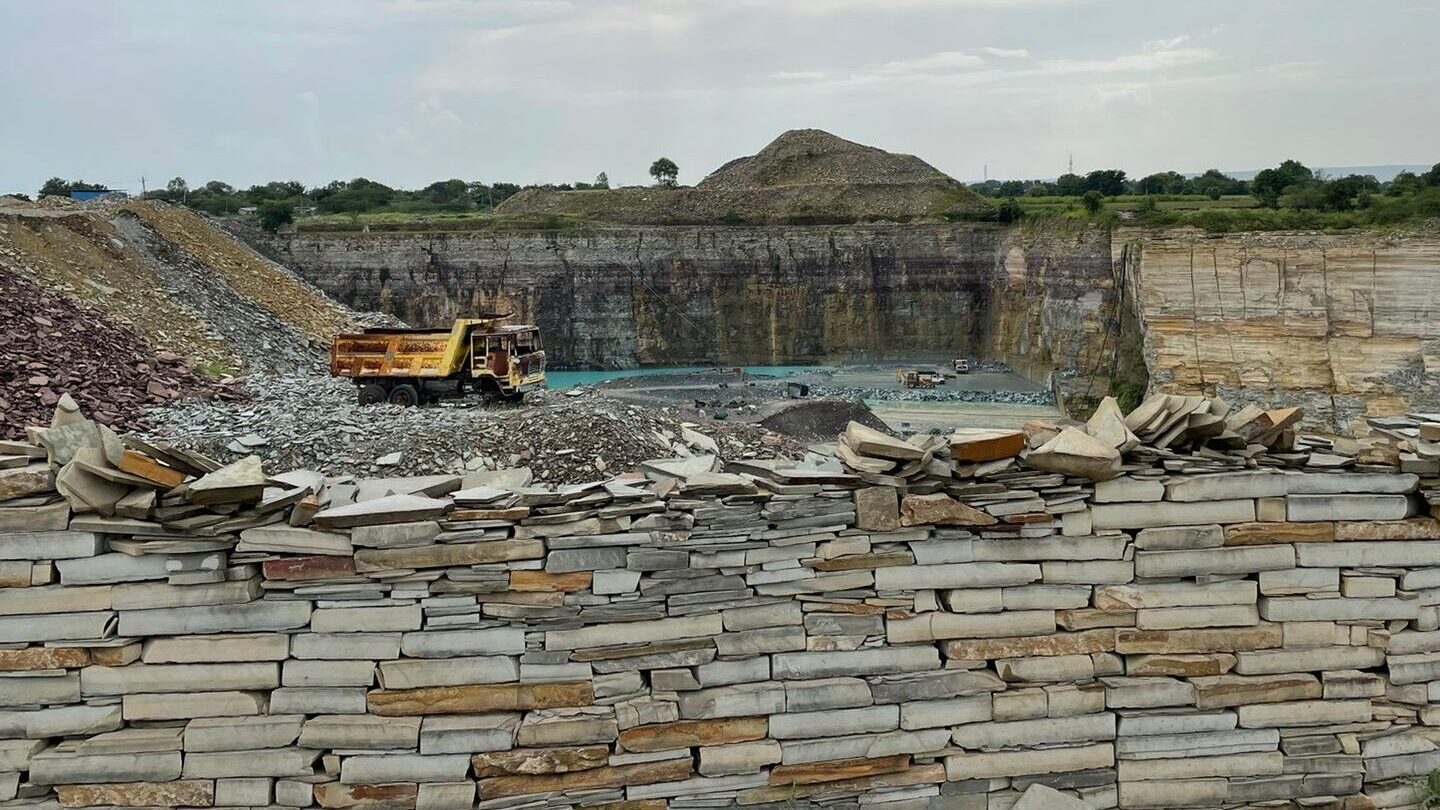
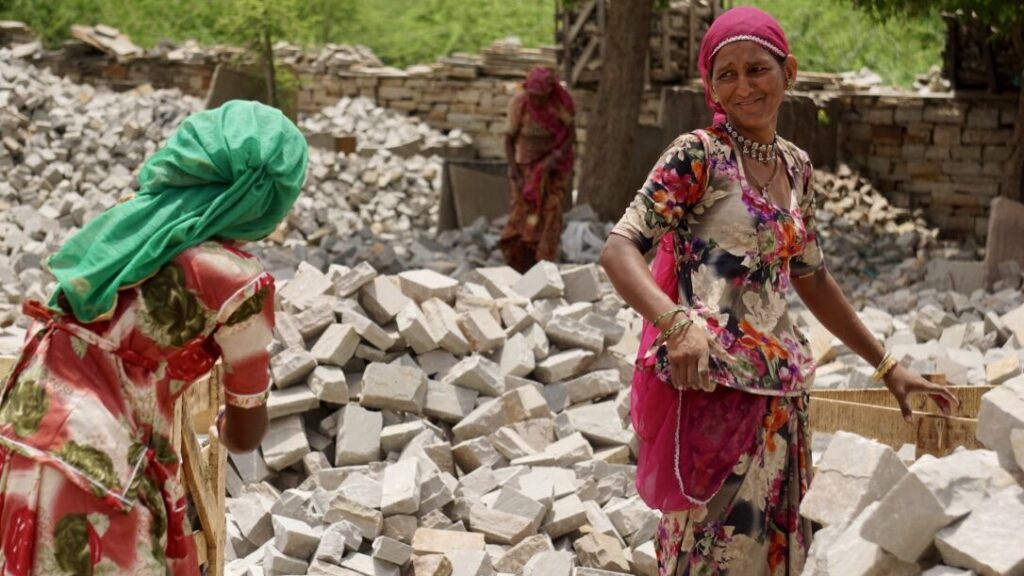
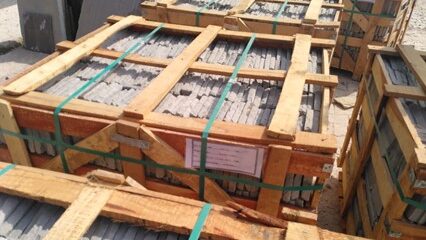
Changes and results at government level
Government legislation and action
The government of Rajasthan incorporated a child-labour-free clause into its procurement policy. All the purchases, tenders and work orders made by the state government must adhere to this clause.
In Bundi district, the government issued orders to ensure the implementation of occupational health and safety measures in the sandstone mines. Manjari and ARAVALI demanded improved, less hazardous mining practices, wet drilling, and access to silicosis compensation. These have also been incorporated into the orders.
A significant number of children in the intervention area have lost one or both parents. Manjari and ARAVALI also advocate for children to have access to various social protection schemes. Children’s access to schemes is barred for a number of reasons, especially due to a lack of documents such as birth certificates and identity papers.
Child Friendly Village Guidelines
In line with the Sustainable Development Goals (SDGs) commitments, the Indian Government is making efforts towards the localisation of SDGs. Making the Indian villages Child Friendly has been identified as a priority. To strengthen their implementation, ARAVALI has developed Child Friendly Village Guidelines for various stakeholders. The guidelines include the roles and responsibilities of different stakeholders, as well as tools that can be applied. The guidelines were tested in a district with the involvement of district authorities and village institutions. The government of Rajasthan has adopted the guidelines for broader replication in the state.
Community libraries
Manjari runs community libraries in the villages. The libraries have turned out to be instrumental in motivating children to aspire, dream and learn. The libraries also provide children with a space for discussing the stories and information they learn in these libraries. ARAVALI shared this experience with the government of Rajasthan, along with a note on how and why libraries are important for every village.
The government accepted the idea and gave ARAVALI responsibility for setting up libraries across the state. ARAVALI is also responsible for the identification, induction and capacity-building of the staff who run the community libraries.



